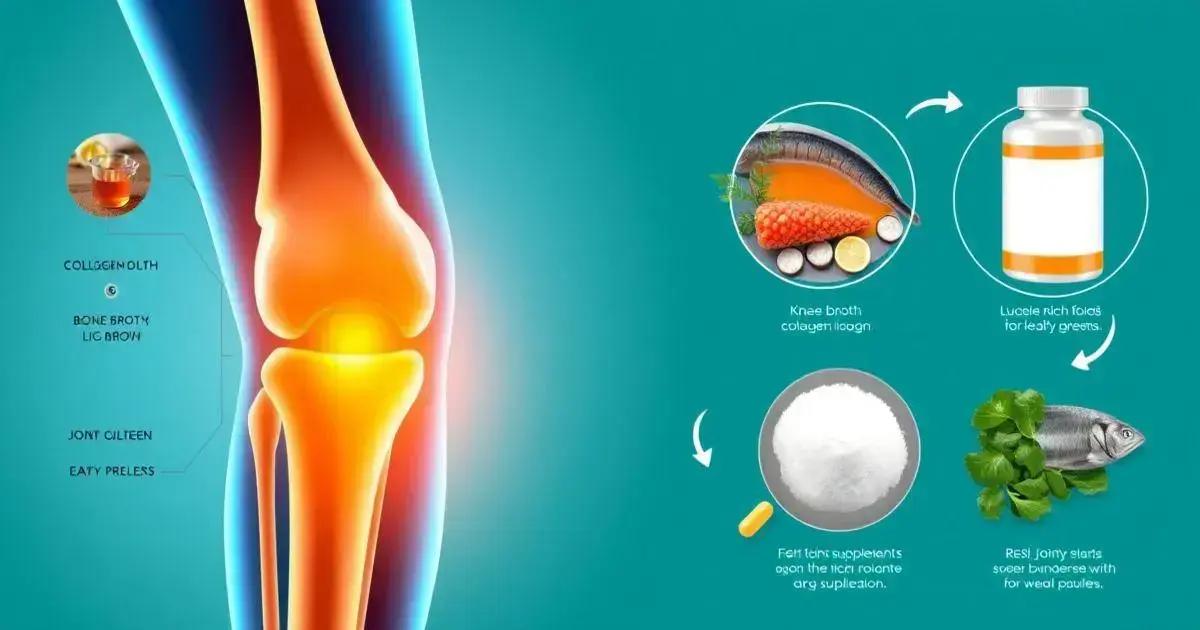Stretching techniques, including static stretching, dynamic stretching, proprioceptive neuromuscular facilitation (PNF), and foam rolling, are crucial for enhancing flexibility and joint mobility. Static stretches lengthen muscles, dynamic stretches prepare the body for activity, PNF combines stretching with muscle contraction for effectiveness, and foam rolling helps release muscle tightness. Regular practice of these techniques can improve flexibility, joint function, and overall physical performance, while also reducing injury risk.
Collagen is a vital protein that plays a crucial role in the health of our knees, providing structural support and maintaining the integrity of cartilage. As we age or engage in physical activities, collagen levels can decline, leading to discomfort and joint issues. In this article, we will explore the importance of collagen in knee health, its benefits, and how to effectively supplement it for optimal joint function.
Understanding Collagen in the Knees
Understanding Collagen in the Knees
Collagen is a crucial protein that provides structural support to various tissues in the body, including the knees. It is a primary component of cartilage, ligaments, tendons, and synovial fluid, all of which contribute to the overall function and health of the knee joints.
Here are some key aspects to understand about collagen in the knees:
- Composition of the Knee Joint: The knee joint is made up of several components, including bones (femur, tibia, and patella), cartilage, ligaments, tendons, and synovial fluid. Collagen provides essential structural support to cartilage, allowing it to absorb shock and reduce friction.
- Types of Collagen in the Knees: The most relevant type of collagen in the knee is Type II collagen, which is primarily found in cartilage. It helps maintain the cartilage’s structure, allowing it to absorb shock and reduce friction between bones.
- Role in Joint Health: Collagen helps maintain the integrity of cartilage, which is essential for smooth and pain-free movement in the knees. Healthy collagen levels can prevent wear and tear, reducing the risk of degenerative joint conditions such as osteoarthritis.
- Impact of Aging: As individuals age, the natural wear and tear on joints can lead to discomfort. The decline in collagen production and cartilage integrity contributes to joint pain.
- Importance of Nutrition and Supplements: Proper nutrition and supplementation can help support collagen production in the body. Foods rich in collagen or supplements containing collagen peptides can provide the necessary building blocks to promote knee health.
By understanding the role of collagen in the knees, individuals can take proactive steps to maintain their joint health and prevent discomfort as they age or engage in physical activities.

Benefits of Collagen for Knee Health
Benefits of Collagen for Knee Health
Collagen is vital for maintaining healthy knees and offers a variety of benefits, particularly for individuals suffering from knee pain or conditions such as osteoarthritis. Here are some key benefits of collagen specifically for knee health:
- Reduces Joint Pain: Collagen supplementation has been shown to alleviate joint pain in individuals with osteoarthritis and other joint disorders. By enhancing cartilage structure, collagen can help reduce discomfort during movement.
- Supports Cartilage Integrity: Type II collagen, mainly found in cartilage, is essential for maintaining its structure. Supplementing with collagen can help prevent further degradation of cartilage, which is particularly beneficial for individuals with osteoarthritis.
- Improves Mobility: By enhancing joint lubrication and reducing inflammation, collagen can help improve overall mobility and flexibility in the knees, allowing for smoother movement.
- Promotes Cartilage Regeneration: Collagen has been shown to stimulate the production of cartilage cells, promoting the regeneration and repair of damaged cartilage, which is vital for maintaining healthy knee joints.
- Reduces Inflammation: Collagen may help modulate the body’s inflammatory response, leading to decreased inflammation in the knees, resulting in less pain and improved functionality.
- Supports Overall Bone Health: In addition to its benefits for cartilage, collagen may contribute to bone health by enhancing bone density and strength, further supporting joint stability.
Incorporating collagen into your diet, whether through food sources or supplements, can provide these benefits, making it a valuable addition for those looking to support their knee health and alleviate discomfort. However, it is essential to consult with a healthcare provider before starting any new supplement.
Sources of Collagen for Joint Support
Sources of Collagen for Joint Support
Collagen can be obtained from various dietary sources and supplements that specifically support joint health. Here are some key sources of collagen beneficial for joints:
- Animal Sources:
- Chicken Cartilage: One of the richest sources of Type II collagen, chicken cartilage is commonly used in joint support supplements and can be found in the sternum of the chicken.
- Bovine Cartilage: Cartilage derived from cows is another significant source of Type II collagen and is frequently used in dietary supplements aimed at supporting joint health.
- Fish and Fish Skins: Fish, particularly those with skin, contain high levels of collagen. Fish collagen is often considered to have higher bioavailability, meaning it is more easily absorbed by the body.
- Bone Broth: Bone broth made from simmering animal bones and connective tissues is rich in collagen and provides a natural source of nutrients that support joint health.
- Collagen Supplements:
- Hydrolyzed Collagen: Many collagen supplements contain hydrolyzed collagen, which has been broken down into smaller peptides for easier absorption. Look for products specifically labeled as containing Type II collagen.
- Collagen Powders: These concentrated forms of collagen can be easily mixed into beverages or foods, making them a versatile option for daily supplementation.
- Plant Sources:
While plant sources do not contain collagen, certain plant-based foods can support the body’s natural collagen production. Foods rich in vitamin C (like oranges, strawberries, and bell peppers) and antioxidants (like berries and leafy greens) can help promote collagen synthesis.
Incorporating both animal-based sources and supplements can help individuals maintain adequate levels of collagen, supporting their joint health and overall well-being.

How to Supplement Collagen for Knee Pain
How to Supplement Collagen for Knee Pain
Supplementing collagen can be an effective strategy for alleviating knee pain and supporting joint health. Here are some guidelines on how to effectively supplement collagen for knee pain relief:
- Choose the Right Type of Collagen: For knee pain, Type II collagen is highly recommended as it is specifically found in cartilage. It supports joint health and can help reduce pain and inflammation.
- Select a Quality Supplement: Look for high-quality collagen supplements that are third-party tested for purity and potency. Ensure the product is specifically labeled as containing Type II collagen to target knee health.
- Follow Recommended Dosages: The typical dosage for Type II collagen supplements usually ranges from 40 mg to 600 mg per day. For knee pain relief, a dosage of around 40 mg to 60 mg per day is often suggested based on studies.
- Take with Meals: For optimal absorption and to reduce the risk of gastrointestinal discomfort, it is recommended to take collagen supplements with meals.
- Be Consistent: For best results, take collagen supplements consistently over time. Many individuals may start to notice improvements in knee pain and mobility within a few weeks, but full benefits may take several months of consistent use.
- Combine with Nutrients Supporting Collagen Production: Consider pairing collagen supplementation with nutrients that enhance collagen synthesis, such as vitamin C, zinc, and copper. This can improve the effectiveness of the collagen you are supplementing.
By following these guidelines for supplementing with collagen for knee pain, individuals can effectively enhance their collagen levels and support their joint health in a safe and beneficial manner.
Recommended Dosage and Usage
Recommended Dosage and Usage
When supplementing with collagen for joint mobility, it is essential to follow appropriate dosage and usage guidelines to ensure effectiveness and safety. Here are some recommendations:
- Typical Dosage: The common dosage for collagen supplements generally ranges from 2.5 grams to 15 grams per day, depending on the specific product and its concentration. For joint health, many studies suggest a dosage of around 10 grams per day.
- Forms of Collagen: Collagen is available in various forms, including powders, capsules, tablets, and liquid extracts. Choose the form that is most convenient for you and fits easily into your daily routine.
- Timing of Doses: For optimal results, it is recommended to take collagen with meals to enhance absorption. If using powdered forms, consider mixing it into smoothies, water, or other beverages.
- Duration of Use: Collagen can be taken for both short-term and long-term purposes. Some individuals may notice improvements in joint mobility and pain relief within a few weeks, but optimal benefits may take several months of consistent use.
- Consult a Healthcare Provider: Before starting any new supplement, especially if you are pregnant, nursing, or have underlying health conditions, consult with a healthcare provider. They can help determine the appropriate dosage and ensure that it won’t interact with any medications you may be taking.
By adhering to these dosage and usage recommendations, you can effectively incorporate collagen into your health regimen and support your joint mobility safely.
Conclusion
Joint mobility is a critical aspect of overall health and well-being, influencing daily activities, physical performance, and quality of life.
Maintaining good joint mobility is essential for facilitating movement, reducing pain, and preventing injuries. By prioritizing flexibility exercises, engaging in regular physical activity, and incorporating joint support supplements, individuals can enhance their joint mobility.
Recognizing the importance of joint mobility allows individuals to take proactive steps in maintaining their health, especially as they age. A commitment to strategies that support joint function can lead to improved overall health, increased activity levels, and a more fulfilling life.
FAQ – Frequently Asked Questions about Joint Mobility Exercises
What are joint mobility exercises?
Joint mobility exercises are movements designed to improve the range of motion and flexibility of the joints, enhancing overall joint function and reducing stiffness.
Why is it important to improve joint mobility?
Improving joint mobility is essential for maintaining overall physical health, preventing injuries, alleviating joint pain, and enhancing the ability to perform daily activities.
What types of exercises can improve joint mobility?
Effective exercises for improving joint mobility include range of motion exercises, strength training, low-impact aerobic activities, flexibility exercises like yoga and Pilates, and balance exercises.
How often should I do joint mobility exercises?
It is generally recommended to perform joint mobility exercises at least 2-3 times per week, but daily practice can further enhance flexibility and joint function.
Can I do joint mobility exercises if I have joint pain?
If you have joint pain, it’s important to consult with a healthcare provider or physical therapist before starting an exercise routine to ensure the exercises are safe and appropriate for your condition.
Are there any warm-up exercises for joint mobility?
Yes, gentle warm-up exercises such as light stretching or walking can help prepare your joints and muscles for more intense mobility exercises.


